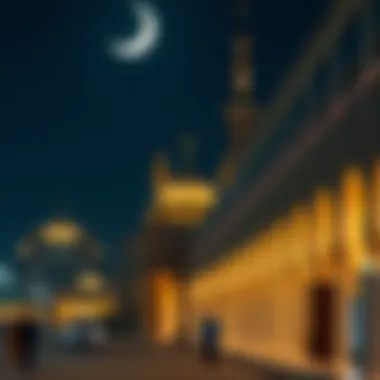Ramadan in the UAE: 2023 Dates and Cultural Insights


Intro
Ramadan is a time of reflection, communion, and transformative cultural practices for millions of Muslims across the globe. In the United Arab Emirates, this holy month takes on a distinct flavor thanks to the region’s rich tapestry of tradition and modernity. The year 2023 promises a unique experience, as the dates of Ramadan oscillate based on lunar sightings, typically falling between March 23 and April 21. With the nation adhering to Islamic customs, the observances during this month not only influence personal practices but also resonate through various sectors, especially commerce and real estate.
Throughout the month, the UAE witnesses vibrant changes in both social dynamics and market behaviors. Whether it’s the bustling iftar gatherings or special promotions in retail sectors, Ramadan serves as a catalyst for community interaction and economic activities. Understanding how traditions shape daily life in the UAE during this period is crucial for investors, developers, and agents looking to navigate this unique market landscape.
In the following sections, we will explore how these cultural observances intertwine with market trends, investment strategies, and their wider implications for societal norms. A deep dive into the essence of Ramadan unveils its significance not only as a holy month but also as a fundamental building block of the community’s spiritual ethos and economic fabric.
Foreword
In every corner of the globe, religious observances take on unique shapes and colorations that reflect cultural nuances and local customs. Ramadan holds a significant place among these traditions, especially within the United Arab Emirates. Underpinned by profound spiritual meaning, the holy month is not just about fasting but is interwoven with various social, cultural, and economic threads that influence the fabric of life in the UAE. This article aims to unpack the layers of Ramadan observances in 2023, focusing on key dates and the broader cultural significance it conveys.
The importance of understanding Ramadan in the UAE lies not only in its religious aspects but also in its ramifications for daily life and commerce. For investors, agents, and buyers in the real estate sector, recognizing how cultural practices ebb and flow provides insights into market behaviors and consumer tendencies during this period. Furthermore, the communal nature of Iftar gatherings and charitable activities adds a rich layer of social engagement that varies from family gatherings to opulent community events. Thus, exploring Ramadan goes beyond simple dates; it navigates through various spheres of life, making it imperative for anyone engaged in the UAE market.
During Ramadan, the emphasis on community and spirituality creates an atmosphere ripe for connections and business opportunities, as well as personal growth. This article will delve into the significance of Ramadan, the details surrounding its observance in the UAE, and how it reflects the nation’s values and ethos. Understanding these elements arms stakeholders with the knowledge needed to navigate this sacred month, both professionally and personally, enhancing their overall engagement within the burgeoning UAE market.
Key Dates for Ramadan in
Understanding the key dates for Ramadan in 2023 is essential for anyone interested in the cultural fabric of the UAE. They not only mark significant moments on the Islamic calendar but also shape personal practices and community activities. These dates offer insights into how traditions are observed within the context of modern life, especially in a rapidly changing society like the UAE.
Start of Ramadan
In 2023, Ramadan is anticipated to commence on the evening of March 22, with the first dawn of fasting likely on March 23. The exact start date can vary, as it relies on the sighting of the moon, a practice deeply rooted in Islamic tradition. Faithful across the UAE prepare themselves mentally and spiritually for this sacred month through prayers, reflection, and community events.
As local mosques prepare for increased attendance, many families also start to gather provisions in anticipation of the daily fasts. Restaurants typically adjust their schedules, operating only for Iftar after sunset, aligning with the needs of the fasting community.
Ramadan Schedule Overview
Throughout Ramadan, the daily routine undergoes a fundamental shift, reflecting the solemnity and beauty of this period. Mornings begin early, often with a pre-dawn meal known as Suhoor, allowing the community to sustain themselves throughout the day. As twilight approaches, the call to prayer signals the end of the fast, prompting families and friends to break their fast together with dates and water—a practice enriched by cultural significance.
An example of a typical daily schedule includes:
- Suhoor: Between 4 am – 5 am, where families enjoy a nutritious meal before fasting begins.
- Work Hours: Many businesses adjust hours, often starting later to accommodate evening routines.
- Iftar: Gatherings commence around 6:30 pm, with communal prayer sessions following.
- Taraweeh: Extra prayers held at night, drawing larger crowds to mosques.
During this time, one can feel the palpable sense of community as the spirit of generosity spills across neighborhoods.
End of Ramadan and Eid al-Fitr
Ramadan draws to a close with the cherished celebration of Eid al-Fitr, which is expected to fall on April 21, 2023. This day marks a significant culmination of months of devotion, prayer, and communal kindness. Festivities begin with a special prayer at the mosque, followed by gatherings that showcase traditional dishes and cultural heritage. The day is characterized by giving, as many engage in the practice of Zakat al-Fitr, contributing to those in need before the Eid prayers.


As part of the Eid traditions, families exchange gifts, don new clothes, and adorn their homes with decorations to share joy and connect with friends and neighbours. This custom reinforces the sense of belonging to a collective culture, strengthened by shared experiences throughout Ramadan.
Eid is not just a celebration of ending fasting; it is also a reunion—a reminder of the importance of community and the ties that often bind strangers into families.
"Ramadan is a month of blessings, a month of forgiveness, and a month of compassion. For many, it’s a time to grow closer to faith and community."
Cultural Practices During Ramadan
Cultural practices during Ramadan hold a significant place in the hearts and lives of the people in the UAE. This month is not merely about abstaining from food and drink but encompasses a much richer tapestry of spiritual and communal activities that bind the community together. The essence of these practices lies in fostering a sense of belonging and enhancing one's spirituality while promoting compassion and empathy within society.
Fasting and its Spiritual Relevance
Fasting during Ramadan is one of the Five Pillars of Islam, serving as a profound exercise in self-discipline and devotion. From dawn until dusk, Muslims refrain from eating and drinking, refining their focus towards worship and reflection. This is not just about physical abstinence; it is seen as a purification of the soul. By experiencing hunger, one can cultivate empathy for those who are less fortunate, creating a deeper connection to the community.
The practice encourages individuals to overcome worldly distractions and immerse themselves in prayers and Quranic recitations. The Tarawih prayers, performed after the obligatory night prayers, are a hallmark of Ramadan nights, creating a communal atmosphere of reverence and reflection.
"Fasting is no mere physical exercise; it’s the path to spiritual enlightenment and growth."
Community Gatherings and Iftar Customs
Iftar, the meal that breaks the fast, is not just a solitary event; it often turns into a communal feast. Families, friends, and even strangers come together to share food and prayers as the sun sets. This fosters a culture of generosity and hospitality. Many establishments, including hotels and restaurants, host special Iftar buffets, where a diverse array of dishes from various cultures are served, creating a melting pot of culinary delights.
Some local traditions involve inviting neighbors and those in need to join in breaking fast, reinforcing the sense of community. It’s common to see individuals setting up tables and serving food on the streets, creating an ambience of warmth and togetherness.
Additionally, public spaces, such as parks and mosques, often come alive during Iftar hours, with communal setups that welcome anyone to join.
Charitable Activities and Zakat
Ramadan is also a time for heightened charitable activities and community service, well-aligned with the teachings of Islam. Many Muslims make a special effort to give Zakat, which is a form of almsgiving, perceived as a religious obligation. It serves as a reminder to share wealth and to help the less fortunate, establishing a more equitable society.
Organizations and mosques facilitate various charitable initiatives, including food drives, iftar meal distributions, and fundraising activities for those in need. These endeavors not only help those who are struggling but also enrich the lives of the individuals who give.
In a city famed for its opulence, many people are reminded of the value of generosity during this holy month, bridging gaps between socioeconomic divides and fostering a more compassionate community. The spirit of giving is interwoven with the cultural fabric of Ramadan in the UAE, rendering it a vital aspect of this sacred time.
In summary, the cultural practices during Ramadan in the UAE reflect deep-rooted traditions that promote spirituality, generosity, and unity within the community. They remind us that the heart of Ramadan lies not just in observances but in the relationships we nurture and the compassion we extend to one another.
Ramadan's Influence on Daily Life
Ramadan exerts a profound influence on various aspects of life in the United Arab Emirates, reshaping daily routines and the broader societal fabric during the holy month. The integration of spiritual observances into everyday activities creates a unique cultural landscape where both individuals and businesses adjust their practices. Understanding these influences is essential for investors, agents, developers, buyers, and sellers wishing to navigate the complexities of the market during this period.
Adjustment of Work Hours


In the UAE, work hours undergo significant adjustments during Ramadan, typically allowing employees to leave earlier than usual to accommodate the fasting schedule. Most businesses shorten their operating hours, enabling staff to engage in evening prayers and break their fast with family and friends. For instance, many offices operate from 9 AM to 3 PM instead of the usual 8 AM to 5 PM.
This shift not only reflects respect for the holy month but also helps maintain productivity. Workers often find that the altered hours boost morale as they can spend more time at home before breaking their fast. However, it poses challenges for businesses, particularly in sectors requiring continuous service, such as hospitality and retail.
- Considerations for Employers:
- Ensuring productivity during shorter work hours.
- Managing client expectations with altered service schedules.
- Offering flexible hours for staff to observe their religious commitments.
This reconfiguration in working hours can impact sectors reliant on consumer engagement. For example, retail stores may stay open later to cater to shoppers who visit after breaking their fast. Overall, these changes underscore the balance between respecting cultural practices and achieving business objectives during Ramadan.
Altered Social Patterns
The social dynamics within the community also shift significantly during Ramadan. Evening gatherings become the norm as families and friends come together for Iftar — the meal that breaks the fast at sunset. These meals are often extravagant, featuring traditional dishes like dates, samosas, and mijadarah. Public celebrations and communal events are common, reflecting the spirit of generosity and compassion that Ramadan embodies.
- Community Engagement:
- Increased attendance at mosques for nightly prayers, known as Taraweeh.
- Organizing charity events, including food drives and community iftars, to support those in need.
- Strengthening of family bonds through shared meals and gatherings.
Interestingly, these social changes can also influence consumer behavior. As the community engages more extensively in dining out and attending festive events, businesses adapt by promoting special Ramadan offers. Restaurants and cafes often feature Iftar menus, the benefits of which extend to the local economy, highlighting the dual impact of Ramadan on social patterns and commerce.
"For many UAE residents, Ramadan is a time of reflection, community, and connection, showcasing the cultural richness of the Emirati society."
These subtle yet significant shifts not only strengthen communal ties but also create a vibrant atmosphere that characterizes the month. For those in investment and real estate, recognizing these trends is crucial to understanding market rhythms and the nuances that emerge during this revered season.
Economic Impact of Ramadan
The month of Ramadan in the UAE extends far beyond its spiritual significance; it also introduces notable fluctuations in the country’s economic landscape. Understanding the economic impact of Ramadan sheds light on how this holy month influences spending behaviors, commerce, and market dynamics, providing investors, agents, developers, buyers, and sellers insights into potential opportunities and challenges during this period.
Retail Sector Adjustments
During Ramadan, retailers often adjust their strategies to align with the changing consumer habits of the month. Shoppers tend to favor evening hours after Iftar, when they can break their fast, leading to a surge in buying activities from sunset onwards. Retailers traditionally respond by extending business hours and launching special promotions.
Some key adjustments include:
- Promotional Campaigns: Shops often roll out exclusive Ramadan deals, including discounts and bundled offers, drawing in customers looking for bargains.
- Themed Products: Many food and beverage companies introduce seasonal items tailored to the celebration, such as dates and traditional sweets, which can boost sales significantly.
- Ambience Changes: Retail stores may adopt festive decorations that resonate with the spirit of Ramadan, thereby creating an enticing shopping environment for customers seeking to celebrate.
Moreover, shopping malls might host community events or entertainment programs to enhance foot traffic and increase dwell time. These adjustments can translate to substantial revenue increases for retailers, contributing positively to the overall economic output during Ramadan.
Tourism and Hospitality Trends
The tourism and hospitality sectors also feel the heat during Ramadan. While many traditional tourist activities may slow down, due in part to fasting rituals and altered operating hours, the demand for hotels and restaurants catering to iftar dinners and suhoor meals often increases.


Important trends include:
- Increased Hotel Bookings: Local and international tourists identify Ramadan as an opportunity to experience rich cultural traditions; hence, hotels offer special packages that include iftar buffets.
- Cultural Events: Various cultural festivals and exhibitions are organized during this period, which attract both locals and travelers keen to immerse themselves in Ramadan’s traditions.
- Dining Adjustments: Restaurants may adjust their operations for iftar, often providing special menus showcasing traditional delights, attracting patrons who are eager to share in communal meals.
Additionally, the growing trend of eco-friendly tourism sees establishments incorporating sustainable practices during Ramadan, appealing to environmentally conscious travelers.
In summary, Ramadan serves as a double-edged sword for the UAE's economy. On one hand, certain sectors thrive with increased revenues, while on the other, some may experience a lull, showcasing the intricate balanc of economic dynamics at play during this holy month.
The economic consequences of Ramadan are profound, manifesting in both retail adjustments and shifts within the hospitality landscape. Understanding these trends enables stakeholders to better prepare for and navigate the unique opportunities presented during this pivotal month.
Real Estate Dynamics During Ramadan
The dynamics of the real estate market during Ramadan hold both unique intricacies and exceptional significance, particularly in a rapidly evolving region like the UAE. This momentous month influences various sectors, including real estate, by shifting the focus of how, when, and what kind of properties are sought after. Observances of Ramadan not only shape the individual lives of residents but also create waves throughout the property market.
Property Market Behavior
During Ramadan, property market behavior shows noticeable variations. A few key characteristics emerge that investors, agents, and developers need to keep in mind:
- Steady Demand with a Seasonal Twist: Many investors remain keen for property acquisitions and rentals during this period, with numerous potential buyers looking to lease homes in anticipation of gatherings for Iftar, the meals breaking the fast. However, the listings may not move as fast as during other parts of the year, given the focus on personal commitments and religious observance.
- Investor Interest in Family-Oriented Properties: As families come together during Ramadan, there's often an uptick in interest for larger homes offering collective spaces, such as living rooms or gardens. This trend emphasizes the cultural importance of unity and gathering.
- Delay in Closing Transactions: The holy month may also introduce delays. Meetings might get postponed, and negotiations can slow down considering the observances and busy schedules of both agents and clients. It's essential to brace for a slower transaction pace.
“In the UAE, Ramadan transforms the real estate landscape, intertwining personal and professional realms as community ties tighten.”
Impact on Buyers and Sellers
For both buyers and sellers, Ramadan introduces a blend of opportunities and challenges:
- Buyers - Selective Consideration: Potential buyers may approach the market more thoughtfully. The spiritual reflections during this month encourage families to seek homes that offer comfort, tranquility, and proximity to communal prayers. Buyers are more likely to prioritize their values and long-term suitability rather than rushing for the best deal.
- Sellers - Adjusting Expectations: On the flip side, sellers must understand that while demand persists, expectations may need to be managed. It's wise for sellers to highlight the property's suitability for family life and gatherings during Ramadan. Properties that accommodate larger families tend to attract more interest.
- Market Adjustments Post-Ramadan: Once Ramadan concludes, the market generally sees a resurgence. Many individuals who delayed decisions during the holy month will seek to advance transactions promptly afterward. Hence, for those working in the real estate sector, it's crucial to stay prepared for a potential influx of activity.
To stand out in this fluctuating environment, real estate professionals should focus on communicating the unique benefits of the properties they represent, perhaps emphasizing community aspects that resonate well with the values celebrated during Ramadan.
In summary, the intersection of Ramadan observances and real estate dynamics in the UAE presents both opportunities and considerations. Recognizing these intricacies can pave the way for better decision-making amongst buyers, sellers, and real estate professionals alike.
Culmination
Understanding the cultural significance of Ramadan in the UAE goes beyond the rituals and observances; it touches the very essence of community bonding and spiritual development. As the holy month unfolds, it presents a unique tapestry of shared experiences and values that resonate deeply across diverse backgrounds. The practices surrounding fasting, charity, and communal meals during this time foster a sense of belonging and mutual respect, especially in a cosmopolitan environment like the UAE.
Reflections on Ramadan
Ramadan offers a moment for self-reflection, encouraging individuals to contemplate their spiritual journey in a communal context. Practicing Muslims engage in deep introspection, seeking to purify their hearts and align their actions with their beliefs. Such reflections also extend to adherents of other faiths, promoting understanding and empathy through shared community events, such as iftar gatherings. These communal dinners not only break the fast but also represent a bridge between cultures and traditions, showcasing the UAE's rich diversity. Here, differences blend seamlessly—linking people together in acceptance and unity.
Moreover, in the hustle of modern life, Ramadan acts as a reminder to slow down and reconnect with what truly matters. It's a time when many prioritize family and community, setting aside the everyday rush. This perspective often shifts how people view their relationships—prompting an appreciation for their loved ones and an enhancement in the quality of social interactions.
Looking Ahead
As we gaze into the future, the societal implications of Ramadan will likely continue to evolve. Economic dynamics, especially in sectors like retail and hospitality, have begun to adapt to the growing diversity within the UAE. Marketers and business owners are increasingly aware of the need to cater to a wider audience during this sacred time, promoting inclusive practices that invite engagement across various cultural backgrounds.
Looking ahead, it's essential for stakeholders in real estate, investment, and community development to recognize the long-term benefits of embracing Ramadan's spirit. Aligning initiatives with community-focused engagement—such as sponsoring communal iftars or supporting charities—can play a vital role in enhancing corporate reputations and fostering ongoing relationships with clients and customers.











